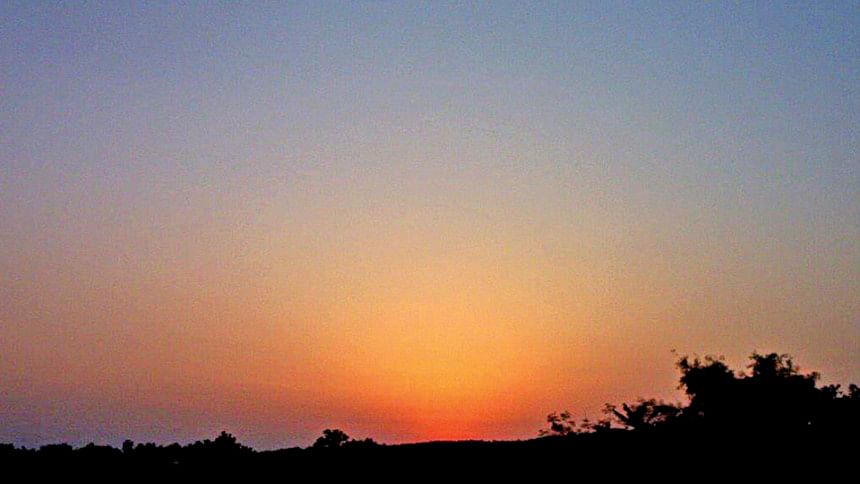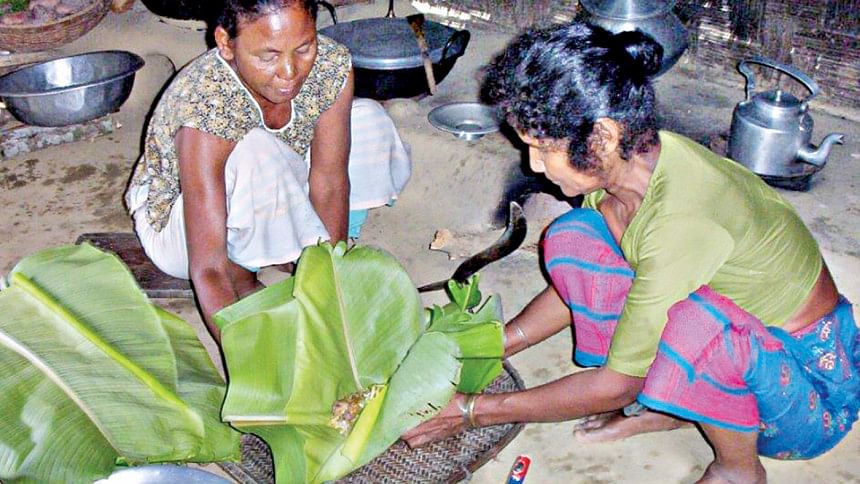Where the hills rest against the sky

It was a place I had visited once, but the intense love I felt for it drove me to visit the small Garo village of Achkipara twice. The first time was in summer, my group went as guests to a Garo family.
While going about the roads, we came upon watermelon fields on both sides of the road. Our Garo host remarked that we could take and eat the watermelons from the fields, as it belonged to their family. Not a moment was wasted as the whole group immediately delved into the fruity goodness.
It was a scene straight out of a movie as we sat right there in the fields devouring the watermelons!
On the same path the lush green held an astounding sight. The greens varied so immensely in shades. In some places, the green was graced by yellowing paddy fields. Large trees spread on the edges of the land. In the distance, the hills lined up. Right across the hills was the India border, the hills cradled this beautiful green land. And the sky, as if the hills leaned right against it.
Probably it was a scene like this that made Nazrul write – "Akashe helan diye pahar ghumay oi" [Behold the hills that rest against the sky].
After plodding through the tiresome roads, when we finally reached Haluaghat, the mesmerising scenery left us hanging. Is this really within the Bangladesh border, or even this world?
The last time I had gone to Jaflong, more beautiful places all belonged to the India. All that was left to this side were the dust and dirt, crowds and long lines of trucks. The second we entered Haluaghat, our exhaustion of the day evaporated — the vista of green paddy fields, the hills that were set further, and the sudden sight of a river occasionally, all cleared away the tiredness!
A small tea stall graced the side of the road. The stove had milk being heated, the tea with that milk and biscuits were like heavenly manna to us. Already someone from the group had procured a small bowl of cream and finished it up despite the slight tongue searing heat.
Going just a bit forward, we found a man with a basket of chicken eggs.
We wasted no time to buy those and had them set to boil in a nearby tea stall.
When we finally reached our destination, noon was well past. A neat and clean home awaited us. Right at the entrance, a large pond with cemented sides greeted us.
On one side of the pond, a cross caught my eye. The people of the house believe that the ones who have left them for the other side, their souls gather around this cross once a day.
As we freshened up, mouth-watering indigenous dishes started arriving. We kept wondering, why in the world did we have to eat to all those things before? But that did not stop the bowls from being empty!
The taste still lingers at the tip of my tongue till this day. Every day onwards till we stayed, the daily feast included fresh fish from the pond, chicken eggs, binni rice, food cooked inside banana leaves, local duck, milk — we should have been 'tired' with so much goodness, yet we did not stop!
There are a number of large waterholes in Achkipara, alongside numerous trees and an old church. If anyone asks me what's there to see, I will reply without missing a beat – a beautiful little village, soul soothing colours, a number of ancient relics and a lot of good souls.

As luck had it, the trip was during a full moon. If you plan to visit this village, plan your trip on a night of full moon. The magical scenery has to be seen to be believed. The entire surroundings come to life with the moonlight, the sky lights up in a different glow. It made one of my friends sing out "Eto boro akash taake bhorle jostnay, ogo chand raate hae tomake bojha daay," Pulak Bandyopadhyay's lyrics never fit better. Night blooming Jasmines (hasnahena) announced their presence with their hypnotising scent.
In between the pauses of the singing, I could hear the cries of owls and other night birds. The light of the full moon was so strong that we could even see the shadow of the surrounding hills. Amidst this magical atmosphere, we were lulled into slumber, it was 10 PM on the clock, but midnight had struck in the heart of the village.
This beauty had pulled me once again, this time to attend the biggest festival of the Garo tribe – Wangala!
The ambience of this festivity is beyond description as it is celebrated with dancing, singing, team competitions and of course, tonnes of sumptuous food. The winning team of the festival is rewarded with a pig.
During this festival, pork is cooked. Other food includes beef, chicken and white rice. Accompanying dishes include pitha, and of course dochoani — a drink made from fermented rice and distilled twice.
If you are looking to take a trip with your group, pick this little village. Just 160 kilometres away from Dhaka, is Haluaghat, an upazila of Mymensingh, and Achkipara is a village there.
You can take a trip over the day after a night stay in Mymensingh. Haluaghat also has a number of NGO guest houses, you could stay there as well. As always do check if there is any vacancy before planning the trip.
Translated by Iris Farina

 For all latest news, follow The Daily Star's Google News channel.
For all latest news, follow The Daily Star's Google News channel. 



Comments